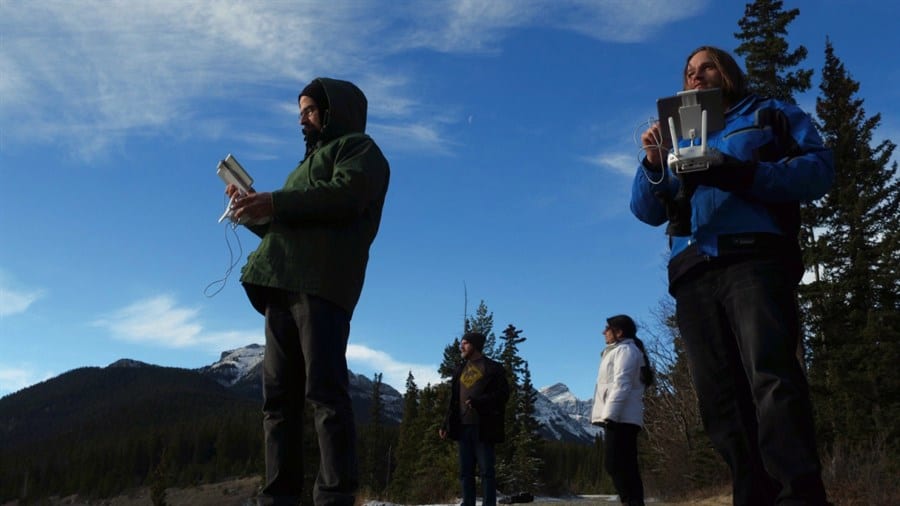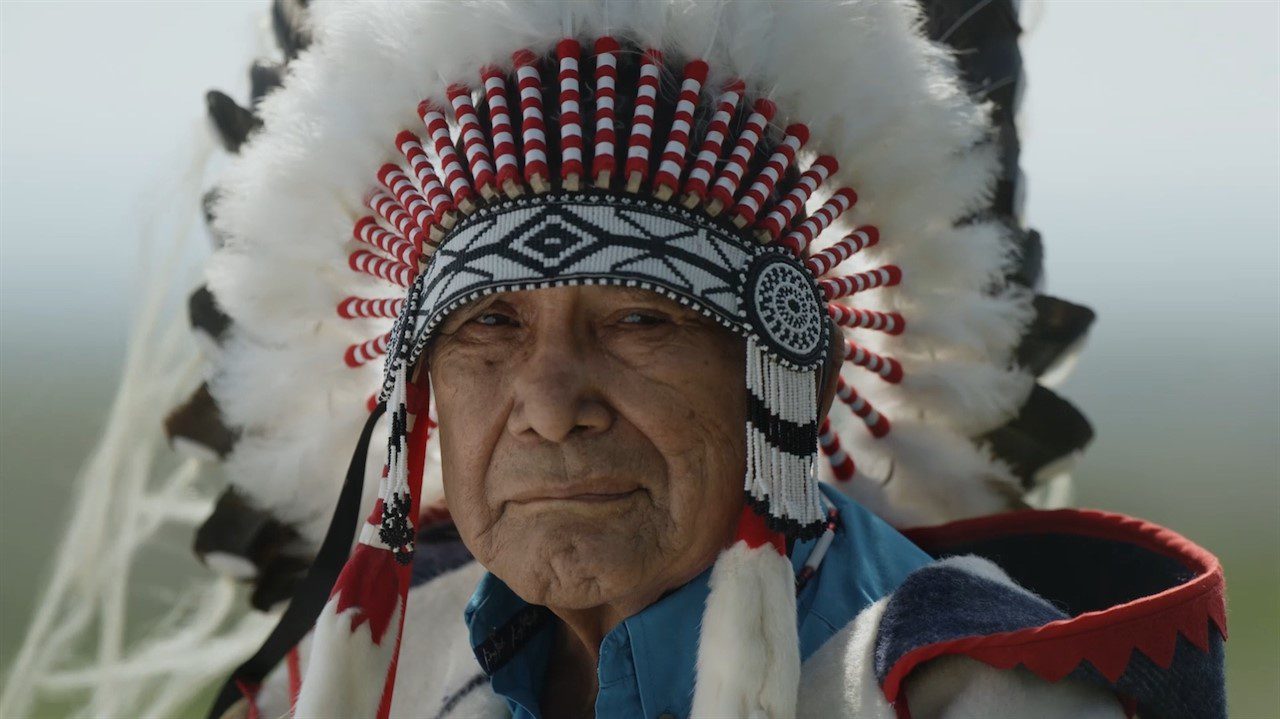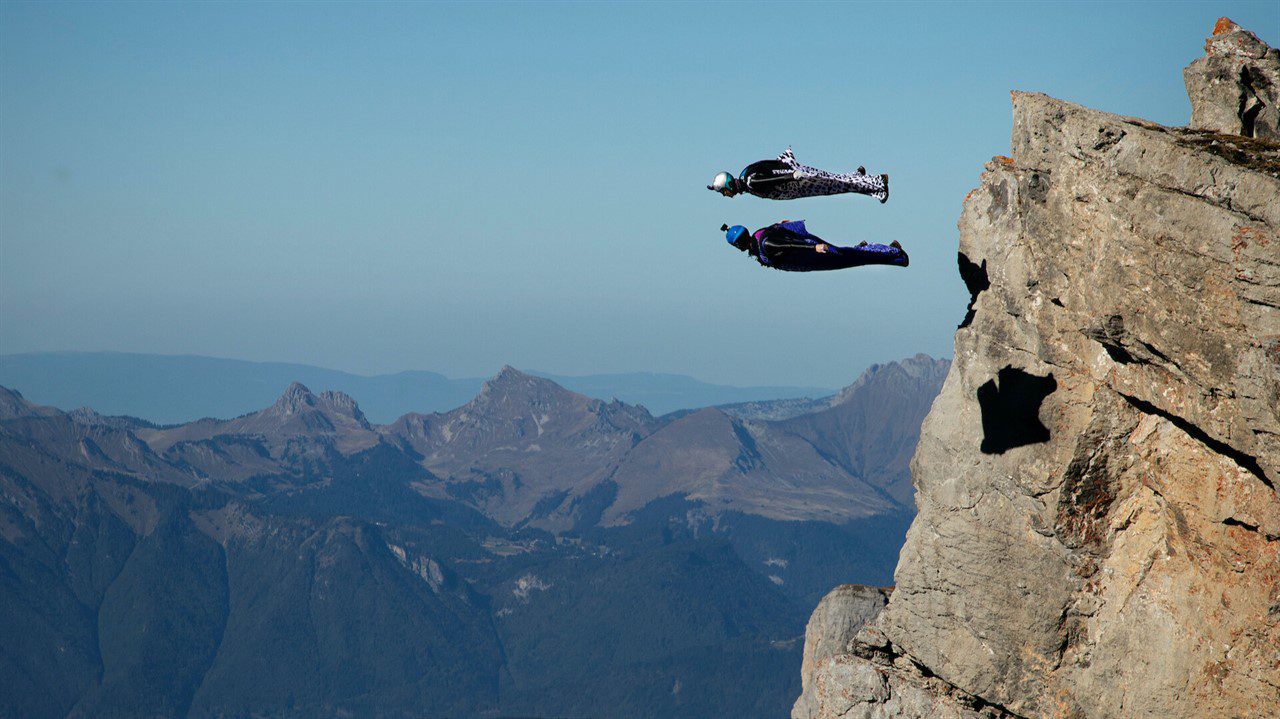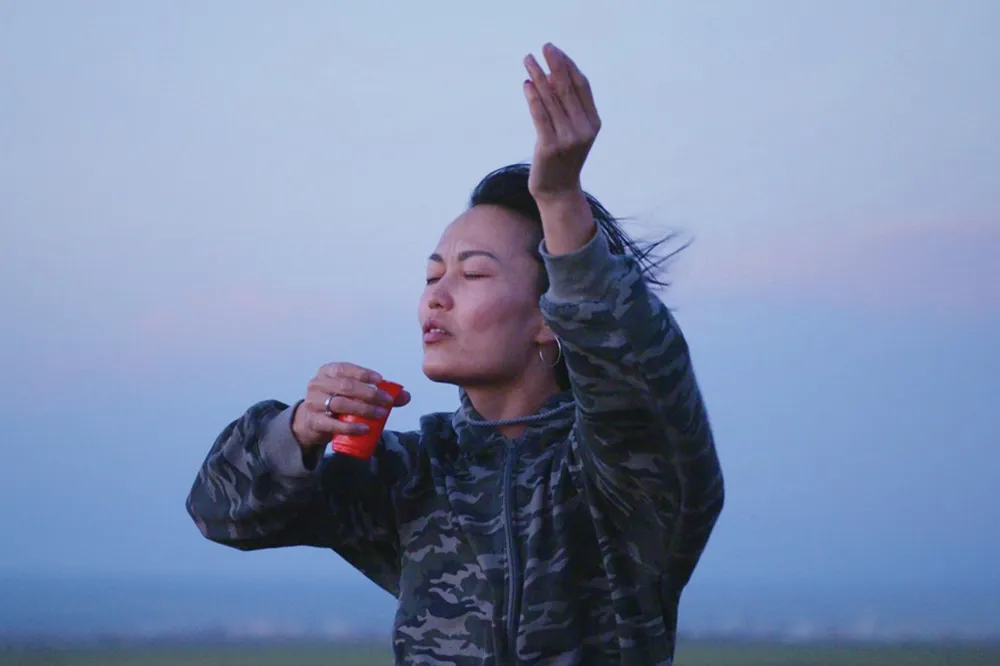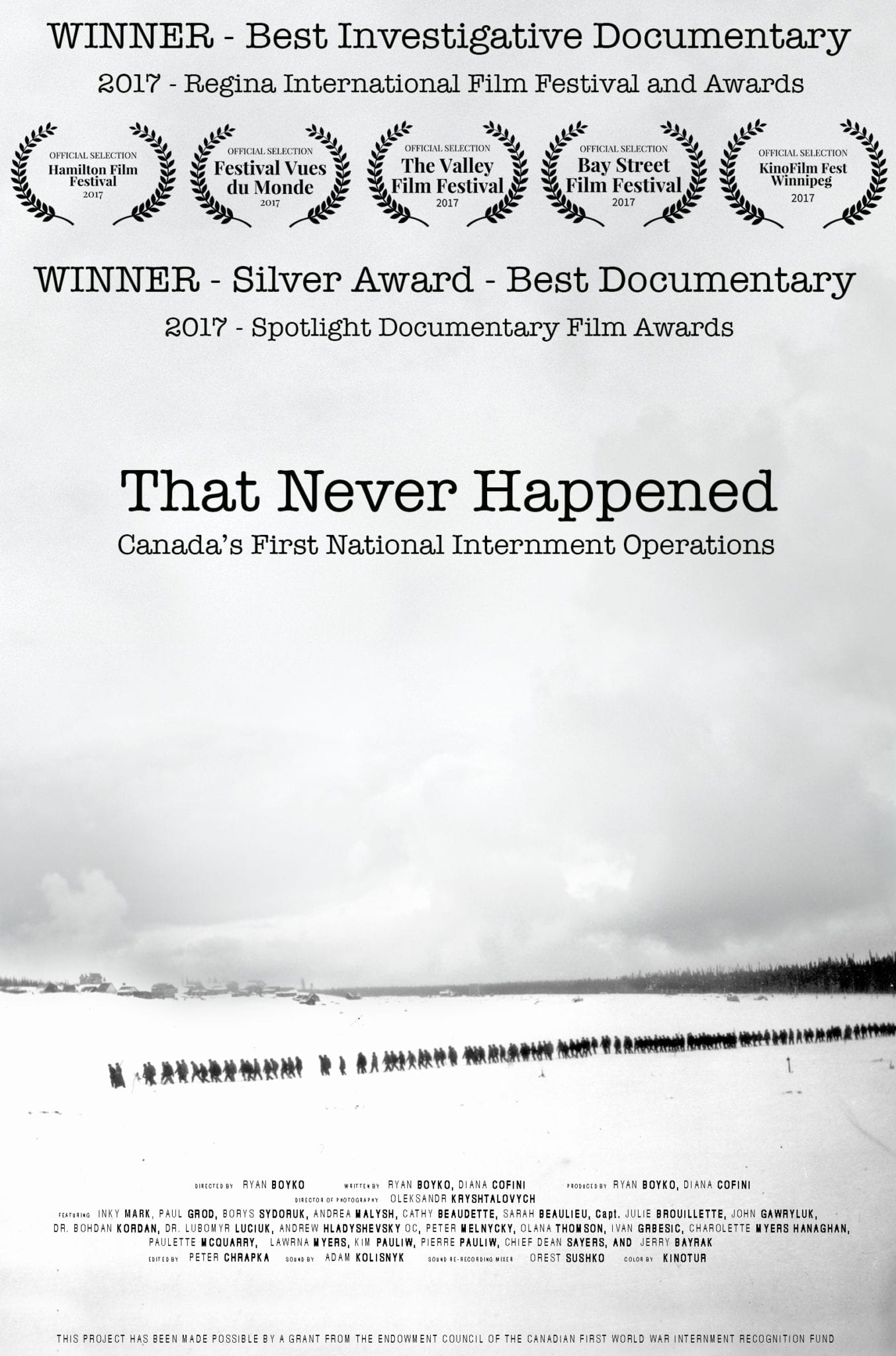 Directed by Ryan Boyko, That Never Happened: Canada’s First National Internment Operations?reveals the story of Canada’s first national internment operations between 1914 – 1920, when over 88,000 people were forced to register and more than 8,500 were wrongfully imprisoned in internment camps across Canada, not for anything they had done but because of their heritage. Although the public records were destroyed in 1954, a few brave men and women began working over 30 years later in order to reclaim this piece of history so that future generations would be aware. As he discovered more about this tragedy, Boyko was amazed at how little information there was about it and became increasingly determined to make sure that the story was told.
Directed by Ryan Boyko, That Never Happened: Canada’s First National Internment Operations?reveals the story of Canada’s first national internment operations between 1914 – 1920, when over 88,000 people were forced to register and more than 8,500 were wrongfully imprisoned in internment camps across Canada, not for anything they had done but because of their heritage. Although the public records were destroyed in 1954, a few brave men and women began working over 30 years later in order to reclaim this piece of history so that future generations would be aware. As he discovered more about this tragedy, Boyko was amazed at how little information there was about it and became increasingly determined to make sure that the story was told.
?In 1996, I saw another documentary [on the topic] and I learned a little bit about it,? he begins. ?At that point in time, it was called the Ukrainian Internment Operations because there weren?t really any details. There wasn’t detail about the other communities that were affected. There wasn’t a lot of detail about what it was, just that something had happened. So, I went to my grade school teacher and I said, ‘Can you tell us a little bit about the Ukrainian Interment during World War I?’ And he said, ‘You mean the Japanese interment during World War II?’ And I said, ‘No, I mean the Ukrainian Interment during World War I.’ And he looked at me and said, ‘That never happened.’?
??That?s ultimately why we chose that title. To honor those people who were faced with that negative experience of being told that it never happened. We don’t know how many people were told that and stop looking. That’s part of why it’s important that we tell this story as it is [because] others were told that it never happened. Maybe those people that stopped looking at that time will start looking again.”
While Canada is most frequently associated with its value of global cultures and peacekeeping, news of a hitherto unknown internment operation seems shocking. Still, Boyko believes that fear has been the primary reason that this story went untold in the history books.
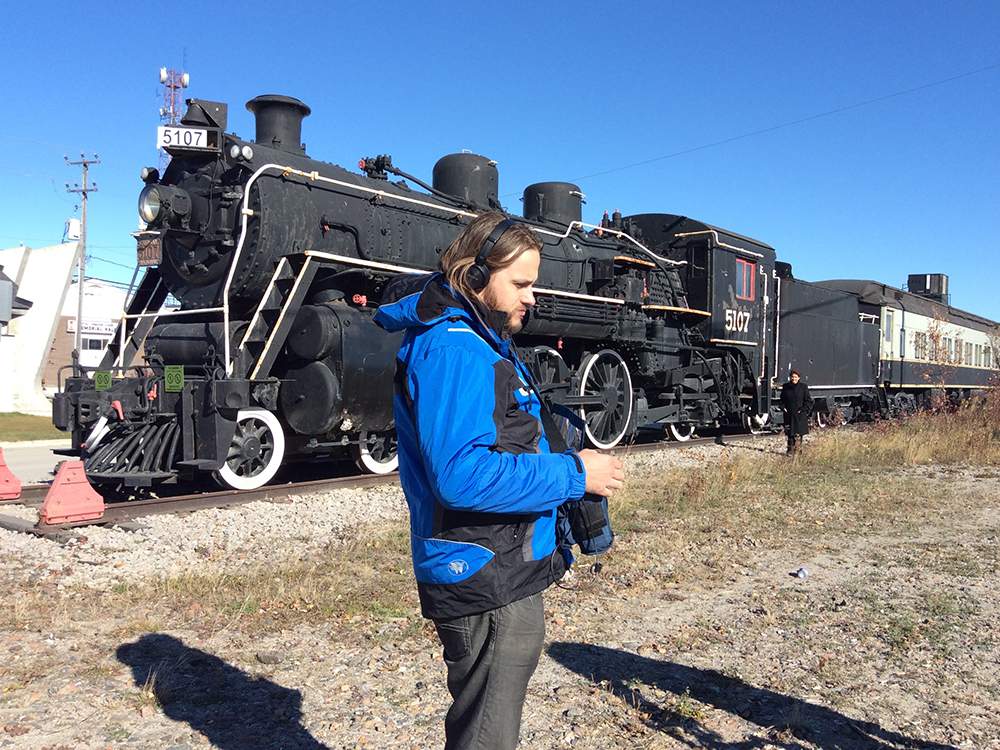 ?I think one of the key things that we understand is that, once people were released from these camps, whether it was because of the camps had ended or paroled by a specific company, they didn’t want to talk about it,? he recalls. ?A lot of them were not given the pay right away or escaped or died in the camps, [but] no one ever received that money because people were afraid to go and talk to the government. They were afraid to go through the due process, in case they ended being rounded up again. A lot of people just kind of said, ‘Okay, this is not good. I’m going to forget it and I’m willing to work and I’m going to be the best Canadian citizen that I can… or they left and went back home.?
?I think one of the key things that we understand is that, once people were released from these camps, whether it was because of the camps had ended or paroled by a specific company, they didn’t want to talk about it,? he recalls. ?A lot of them were not given the pay right away or escaped or died in the camps, [but] no one ever received that money because people were afraid to go and talk to the government. They were afraid to go through the due process, in case they ended being rounded up again. A lot of people just kind of said, ‘Okay, this is not good. I’m going to forget it and I’m willing to work and I’m going to be the best Canadian citizen that I can… or they left and went back home.?
Despite the fact that multiple governments have fought to keep this story under wraps, he says that recent officials have been more than co-operative in uncovering information to bring this story to light.
?I think we have to look at it through the lens of history,? Boyko explains. ?These are the things that were happening in our own country and this is not the only negative thing that happened. I think that, rather than looking at why it happened, I think it’s more important to look at the fact that we’re not allowed to bring it to the surface. As we talk about in the documentary, there were five different prime ministers that this recognition went through, but really the last two governments, including the current government?both conservative and liberal government?really supported the making of this film. They opened doors, and [gave] access to Parks Canada and the Canadian military. Our Canadian government just used this as part of the permanent mission of Canada to the United Nations to screen on a global level, talking about what Canada has done wrong in the human rights aspect and how we can learn from these mistakes and move forward, not just as our country but as a global society.?
After his experience at the UN, Boyko was stunned at the thoughtful conversation and relevant discussion that the film inspired amongst delegates from multiple countries.
?When we do [Q&A events], we’re used to having different people ask [questions] and carry on the conversation,? he claims. ?That’s what we were having at the UN and the people who were there supporting the event were saying that events [there] are lucky if they get one question. We could have gone for an hour with questions from people talking. Learning that it’s not normal for delegates to ask questions about a film, project or presentation really made our trip. We had the opportunity to speak to various different ambassadors from various different countries. It was really an experience of a lifetime, as you can imagine. I’m still trying to come to terms with the fact that we’ve done that. Now that we’ve done that, if I feel like this film will get out.There is no denying that these operations ever happened [anymore]. It’s been seen on the global scale.?
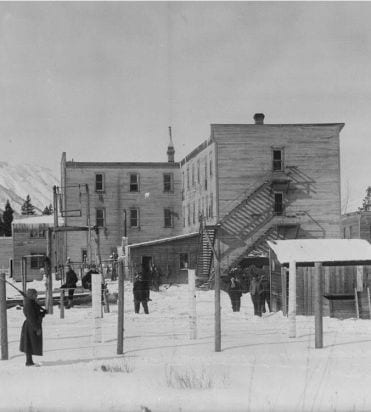 In some ways, it can be easy to ignore the truth of what took place over 60 years simply due to the amount of time that has taken place between now and then. However, he also believes that such callous thinking would ignore the fact that this sort of tragedy could very easily happen again (and, in fact, may already?be happening).
In some ways, it can be easy to ignore the truth of what took place over 60 years simply due to the amount of time that has taken place between now and then. However, he also believes that such callous thinking would ignore the fact that this sort of tragedy could very easily happen again (and, in fact, may already?be happening).
?I hate to say it but, when I look at the media today, it is happening again,? Boyko warns. ?It’s happening in the same way that it has happened in the past. You get some people who are loud enough making enough noise and saying, ‘Look at what’s wrong. Look at who the other is. The other is wrong’ because they don’t understand them. I think we as citizens, not just of Canada, but as the citizens of the world need to stand up and take the uncomfortable stand where we see things that are wrong happening in the world when we hear alternative facts. We need to stand up and say, ‘No. This is what is right and this is what could happen if we do things wrong.’ This documentary shows what happens after a hundred years of having family separated and being taken away and how it still affects people today.?
Asked what it will take to own the sins of our past, he believes that it will require a great deal of courage to view our history with objectivity and truth.
?I think it takes honesty, openness, communication and truth [to own the shame of our past],? Boyko argues. ?I hope people will watch this film and come away having a conversation. This isn’t the ‘be all and end all’ film about Internment Operations in Canada. In fact, I think this is just the beginning of the opening of a door to the subject that others may not be aware of. I’m hoping that it creates the snowball effect with those conversations, whether we’re talking about residential schools, women’s rights, or human rights. This is just simply a guide to show what we have done when we have done wrong and I think that that opens up a conversation to what can we do right.?
As a result, he also hopes that these conversations lead people to rediscover pieces of their own history as well.
?I?m hoping that the film is evocative and that it creates questions and conversation,? Boyko stresses. ?[I hope] that it opens the doors for people may be are members of the community, whether it’s first generation, second generation or even… maybe somebody from the past was here during that time. Maybe it will open a door for them to start doing some research on their own and figuring out more about the family. Even if it doesn’t take them to the stories that their family was affected by the Internment operations, it might have been into some other realm and something else that they need to know about their families. I just think that it has the possibility to do for individuals something far beyond what we could even comprehend.?
For full audio of our conversation with Ryan Boyko, click here.
That Never Happened?is in theatres now.

